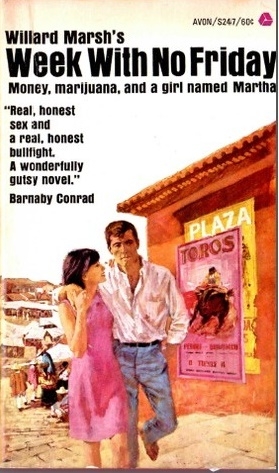Week With No Friday by Willard Marsh is one of only a handful of novels to have been set entirely at Lake Chapala. Published in 1965 by Harper & Row, it tells the story of a troubled expatriate playwright who lives in Ajijic in the 1950s.
The dust jacket of the hardcover edition (274 pages) set up the novel as follows:
Ben Warner, an American writing living precariously in a beautiful Mexican lake town, talks entertainingly and drinks a great deal. His marriage has ended and the women who now pass through his life are just a means of survival. His once-promising resources have been reduced to a tankful of rejected plays and stories.
Yet his world is not without hope — especially when he is on pot. And, even though he has no scruples in using the women who live him, he is no ordinary rascal. Behind his witty, slanderous speech and the clownish guilt of his behavior, he is struggling desperately to keep going — as a man and as a writer.
When Martha McKenzie, a visiting schoolteacher from Iowa, attempts with crusading zeal to save Ben Warner, he can react in only one way: by exploiting her. But both their purposes are diverted by the arrival of Warner’s ex-wife, resulting in an intensely moving and human tragicomedy.”
The photograph of Marsh used in the author’ biography on the back dust jacket of the original hardcover was taken by John Lee, an author and photographer who lived for a year in Ajijic (with his wife Barbara Moore) in 1962-63, and then returned there for nine consecutive summers.
The paperback version of Week with No Friday was subtitled “Money, Marijuana and a girl named Martha – Low-life and high-jinks South of the Border.” The basic description was reworded to read,
After twelve years in Mexico, Ben Warner seemed shamelessly happy just sponging off his neighbors, finding consolation and occasional inspiration in alcohol, pot, and any passable woman who came along. The locals found him muy simpatico, and so did visiting schoolteacher Martha McKenzie, who speedily found him sharing her bed — and her checkbook.
But behind the amusing and eccentric exterior, Ben Warner was a man struggling desperately just to keep going, to make good the wasted years. With the unexpected reappearance of his glamorous ex-wife, the loose ends of his existence suddenly begin to unravel, with results that are as intensely moving as human experience can be.
Week with No Friday was also reprinted in a limited 208-page paperback edition in Mexico in about the year 2000.
 Reviews of Week with No Friday were generally positive. Highlights include
Reviews of Week with No Friday were generally positive. Highlights include
“Real, honest sex and a real, honest bullfight. A wonderfully gutsy book. The author lives, sees and feels deeply on every page.” – Barnaby Conrad
“A good many novels have been written about U.S. expatriates in Mexico, but Willard Marsh’s is the best that I’ve read.” – Vance Bourjaily (another of the many authors who lived for a time in Ajijic).
“Downright irresistible” – Chicago Sun-Times
“A marvelously successful novel” – Book Week
“There is much that is affecting and witty in this first novel, which examines the pangs of a creative personality in exile… Mr. Marsh can create warm, vital characters, a stunning locale and rollicking humor, but the dichotomy in Ben’s character seems not quite resolved. However, this is a writer of promise.” – Kirkus Review
After reading the Kirkus Review, Willard Marsh wrote to his brother-in-law John Williams, also a novelist, bemoaning the fact that “I’ve been a writer of promise for 43 years…”
Verdict: Definitely a keeper!
Several chapters of Foreign Footprints in Ajijic: Decades of Change in a Mexican Village offer more details about the history of the literary community in Ajijic.
Related posts:
- George Rae Marsh (Williams), aka Georgia Cogswell (1925-1997)
- Willard “Butch” Marsh (1922-1970) and his novel about Ajijic in the 1950s
Other twentieth century novels set largely, or entirely, at Lake Chapala include:
- Charles Embree: A Dream of a Throne, the Story of a Mexican Revolt (1900)
- D. H. Lawrence: The Plumed Serpent (1926)
- Arthur Davison Ficke: “Mrs. Morton of Mexico” (1939)
- Ramón Rubín: La canoa perdida: Novela mestiza (1951)
- Ross MacDonald: The Zebra-Striped Hearse (1962)
- Eileen Bassing: Where’s Annie? (1963)
- Barbara Compton: “To The Isthmus” (1964)
- Willard Marsh: Week with No Friday (1965)
Comments, corrections or additional material related to any of the writers and artists featured in our series of mini-bios are welcomed. Please use the comments feature at the bottom of individual posts, or email us.
Tony Burton’s books include “Lake Chapala: A Postcard History” (2022), “Foreign Footprints in Ajijic” (2022), “If Walls Could Talk: Chapala’s historic buildings and their former occupants” (2020), (available in translation as “Si Las Paredes Hablaran”), “Mexican Kaleidoscope” (2016), and “Lake Chapala Through the Ages” (2008).